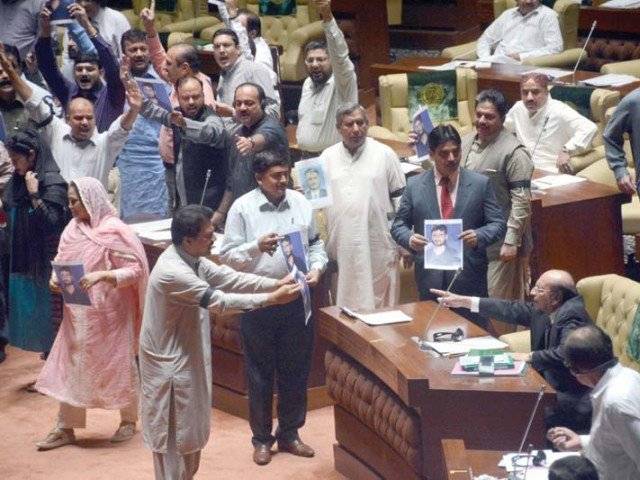There is usually a marked difference between how politics are conducted in the streets, and how it is conducted in the halls of legislative assemblies. Yet, looking at the proceedings of the Sindh Assembly and the National Assembly during the past few days, an observer would be hard pressed to identify which spectacle he was witnessing. Instead of an orderly debate, a battle took place in both the houses. Lawmakers that roam their constituencies in an aura of dignified power and prestige were little better than enraged party workers – albeit older and well dressed.
The MQM wanted to raise the question of extrajudicial killings of its party workers, especially one Mohammed Hashim, yet it did not even give the government time to respond to questions. Walk-outs, sloganeering, table banging, theatrics, rhetoric, and scuffles dominated the sessions, ensuring that not a single constructive action was taken. The highlight of the day- straight out of Hollywood - was when MQM lawmaker Zafar Kamali waving the slain party activist’s photo charged towards the bench of the leader of the house, forcing PPP workers to form a wall in front of the Chief Minister, who then retreated to his chambers for better protection.
For the most part the blame lies with the Muttahida Qaumi Movement (MQM) lawmakers, whose only discernable agenda seemed disruption, yet the government benches share responsibility for this farce too. They stonewalled the MQM’s issues, some of which were legitimate despite the fact that they were designed to create a ruckus. Sessions like these are the low-point of the Pakistani democratic procedure; exposing its lack of maturity and giving ample ammunitions to its detractors who would prefer a much more ‘uniform and disciplined’ leadership.
The behaviour in the parliament is part of a conscious MQM policy, one that is sure to appear in other areas too. Facing a strengthening crackdown, the MQM has decided to use its power to create as much nuisance as it can, in an effort to win some sort of a bargaining chip with the government. If the crackdown continues – and it will – the nuisance is bound to get even more intense. So far the MQM has refrained from using its street power, and paralysing Karachi; if is a matter of time when nuisance turns into full-blown antagonism. While it is certainly effective, such actions have unintended consequences. The MQM seems weak, desperate and isolated, while its actions reek of a guilty conscience, rather than righteous outrage they hope it is.
Saturday, April 20, 2024
A Dysfunctional Legislative

Pak economy improving, funds will be provided on request: IMF
9:57 PM | April 19, 2024
Minister advocates for IT growth with public-private collaboration
9:57 PM | April 19, 2024
Judges' letter: IHC seeks suggestions from all judges
9:55 PM | April 19, 2024
Formula 1 returns to China for Round 5
9:05 PM | April 19, 2024
Germany head coach Julian Nagelsmann extends contract till 2026 World Cup
9:00 PM | April 19, 2024
A Tense Neighbourhood
April 19, 2024
Dubai Underwater
April 19, 2024
X Debate Continues
April 19, 2024
Hepatitis Challenge
April 18, 2024
IMF Predictions
April 18, 2024
Kite tragedy
April 19, 2024
Discipline dilemma
April 19, 2024
Urgent plea
April 19, 2024
Justice denied
April 18, 2024
AI dilemmas unveiled
April 18, 2024
ePaper - Nawaiwaqt
Advertisement
Nawaiwaqt Group | Copyright © 2024





